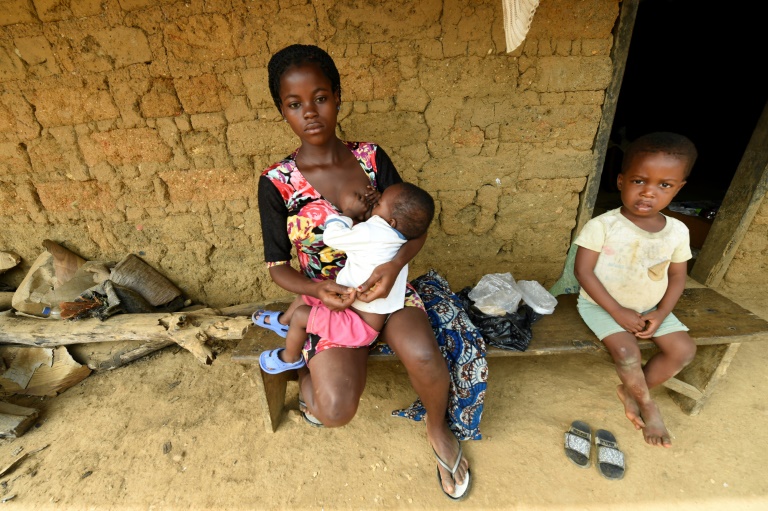John Osang arrived in Nigeria at dawn on the verge of collapse, wearing just shorts and flip-flops after two fevered days running through the jungle from Cameroonian soldiers.
He said he had no other choice. The soldiers were on the hunt for English-speaking separatists. People were being killed.
Since December, troops had occupied Bodam, located on the border with Nigeria, pushing ahead with a crackdown on an independence movement that has taken up arms against the Cameroon state.
“The soldiers are looking everywhere for Ambazonia fighters,” said the exhausted 19-year-old, referring to the name the separatists have given their putative state.
“They looted the houses, broke the doors, took our mattresses, televisions and generators. There’s nothing left,” said Osang, his arms lined with deep scratches from the bush.
For two months, Osang hid in a cassava plantation a few kilometers (miles) from home with his sick mother and older brother.
But as the situation deteriorated he decided he had to escape.
He found sanctuary in Bashu, a remote village in the lush mountains of Cross River State in Nigeria that has seen its population triple to 4,500 because of the Cameroonian influx.
The mud-brick houses of peaceful Bashu are just five kilometres (three miles) from the Manyu River that represents the border with Cameron.
But the tranquility is an illusion.
Residents say they regularly hear helicopters in the sky and “intense exchanges of fire” at night.
Many of the displaced Cameroonians are in shock.
Joseph Mbia Ndem said he had to leave behind the bodies of his wife and brother, who were shot dead on December 24 when soldiers surrounded his village of Dadi.
“They didn’t say anything, they just started shooting,” the former plantain farmer said, his eyes brimming with tears behind small, square-rimmed glasses.
“I’ve never been interested in politics,” said the 74-year-old. “I don’t know why they’re killing us.”
– Gunfire –
Pro-independence supporters have mounted attacks against symbols of the state in Cameroon’s two anglophone regions, which are home to about 20 percent of the country’s 23 million people.
The independence movement developed from a strike in late 2016 by teachers and lawyers against perceived marginalisation by the French-speaking majority.

Yvonne Ndep, an 18-year-old pregnant Cameroonian, breastfeeds her child at a house in Bashu. Thousands have fled to the remote Nigerian village after Cameroon launched a crackdown on anglophone separatists
But, little by little, the crisis has developed into a low-level but brutal armed conflict.
Twenty-two soldiers and police have been killed since November last year, according to an AFP tally.
Yaounde has responded to the separatist movement with massive force, notably around the border with Cross River state.
According to the Cross River state emergency management agency, more than 33,000 people, including many farmers and civil servants, have arrived in the last four months.
Cameroon’s army has refused to say how many troops it has on the ground in the country’s troubled anglophone region.
But Hans De Marie Heungoup, a researcher with the International Crisis Group, estimates that 5,000 to 6,000 men from all security forces have been deployed in anglophone areas.
– Multiple incursions –
Cameroon’s authorities have labelled the separatists “terrorists” and say they are hunting down rebel training camps.
They have repeatedly dismissed videos on anti-Yaounde social media accounts purporting to show attacks on villages and the massacre of civilians.
English-speaking Cameroonian refugees who have fled to dozens of Nigerian villages along the border remain concerned after several incursions by soldiers.
Security sources and aid workers said dozens of Cameroonian soldiers — on foot and not in uniform — caused panic when they turned up in the Cross River village of Danare last week.
The head of the Cross River state emergency management agency, John Inaku, said: “It is not the first time. The first time was in the district of Akamkpa in December.”
Tony Kajang, 22, says Cameroonian soldiers came across the border into Nigeria to say it was safe for people to return — but troops started shooting as his group neared their home village
Several people have also been taken back to Cameroon, he added.
Cross River’s governor, Ben Ayade, complained about “violations of international laws” to senior figures from the defence ministry and army who came from Abuja to assess the situation, according to one Nigerian official.
In Danare, refugees said the Cameroonian soldiers were not hostile but believed they were trying to lay a trap for them.
“Last week, 50 to 70 Cameroonian soldiers came to Danare to tell us our village was safe now and that we could go back home,” said Tony Kajang.
A group of about 30 youths then crossed back across the border to verify the claim, according to the 22-year-old.
“When we got near the village the soldiers started shooting,” he said.
“They killed several of us, I don’t know how many exactly. But only 16 of us came back.”
Download our app